Why You Should Shred Documents
Think about all of the documents that you throw away on a daily basis. Bills, receipts, bank statements, old tax returns — the list goes on and on. However, has it occurred to you that each one of those documents contains sensitive information that could be used to steal your identity?
With fraud and identity theft running rampant, it’s more important than ever to protect your personal information. One of the best ways to do that is to shred your documents.
Don’t Risk Your Identity — Shred Your Documents!
It’s no secret that identity theft is on the rise. Once your personal information gets into the wrong hands, it can be used to open new credit accounts, apply for loans, and even commit crimes. In fact, according to Javelin Strategy & Research, there were 15 million victims of identity theft in 2021, a record high. What’s even more alarming is that the number of identity theft victims has been increasing every year for the past decade. This type of theft can have a devastating impact on your finances, your credit score, and your peace of mind.
Whether you’re a small business owner or an individual consumer, it’s essential to keep your personal information secure. In the era of the internet, it’s easy to forget that computers are not the only storage devices for sensitive information — however, hard copies of documents can be just as revealing. This means that shredding all documents that contain sensitive data before disposing of them is vital to protecting your personal information. These documents include credit card statements, canceled checks, boarding passes, old IDs, and more.
The Importance of Shredding Confidential Documents
While it may seem like a time-consuming task, it’s worth the effort to protect yourself from identity theft and fraud. By shredding documents, you make it much harder for thieves to piece together your personal information and use it for nefarious purposes. So, next time you’re cleaning out your home office or going through your old files, take a few minutes to shred anything that could put you at risk — it’s a simple step that could save you a lot of headaches down the road.
Legal requirements. Shredding documents is a legal requirement for many businesses, though it’s also a good idea for individuals to do the same. For example, many healthcare providers are required to shred patient records. Failing to comply with these regulations can result in hefty fines or even criminal charges.
Client confidentiality. Customers and employees entrust businesses with personal information, and it’s important to protect that information from third parties. Shredding documents is one way to ensure that this information stays confidential.
Desk organization. Finally, shredding documents can help you save space. Keeping old documents around can quickly lead to cluttered offices and filing cabinets. Shredding unwanted documents frees up space so you can focus on more important things.
Conclusion
So, what’s the big deal about shredding your documents?
The answer is simple! It’s all about protecting yourself and your business.
By shredding your documents, you’re ensuring that confidential information remains confidential while protecting yourself from identity theft and fraud. If you have any old financial statements or other paperwork lying around that contains sensitive information, the best practice is to securely shred the material. We also specialize in hard-drive destruction and product destruction services! Get in touch with us today for more information.
FAQs
-
Companies shred documents for many reasons. They may need to get rid of old or sensitive documents containing customer information, financial data, or other confidential information. Shredding these documents protects the company and its client from identity theft, fraud, and other crimes.
-
The most common reason to shred documents is to avoid identity theft, which can occur when sensitive information (like account numbers or Social Security numbers) is improperly disposed of.
-
Any document that contains sensitive or personal information such as account numbers, birth dates, passwords, PINs, or signatures should be shredded along with any identifying or contact information, like your name, address, phone number, or email address.

